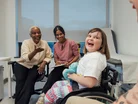Disabilities Data Dearth ‘Impeding Healthcare Equity’

A McKinsey report says there are “sizable and persistent gaps” in health data with respect to people with disabilities.
It adds that an estimated 1.3 billion people are living with “significant” disabilities – roughly 16% of the global population – and that they experience more barriers to healthcare than the general population.
Closing this health gap, says McKinsey, calls “first and foremost for good data collection and usage”.
The report is a joint project between The McKinsey Health Institute (MHI) and The Missing Billion. The MHI is a global health body whose aim is to provide analysis and insight to help advance human health in historically underinvested areas. The Missing Billion is a global initiative to facilitate better health access and outcomes for persons with disabilities.
The report is co-authored by Sunny Sun, a Public Health & Social Sector Partner at McKinsey, Phyllis Heydt, Co-founder of The Missing Billion, and Hannah Kuper, a Professor at the London School of Hygiene and Tropical Medicine.
The study assessed data-collection methods in nine countries: Australia, Brazil, Canada, France, Malawi, South Africa, Thailand, Uganda, and the UK.
The two agencies identified actions countries could take to improve data maturity, as well as actions stakeholder groups could take to help overcome the gap in disability health data.
Disability data needed to close health gap
MHI says better data is needed to:
- Raise awareness of the scale and nature of disparities in health outcomes
- Build awareness of the benefits of improving health equity and outcomes for people with disabilities
- Identify and quantify healthcare access barriers experienced by people with disabilities
- Close the health outcome gap by using data to inform and scale successful outcomes
- Establish standardised measurements, set targets and monitor the progress of interventions
The report says people with disabilities often experience more difficulty accessing healthcare than the population at large.
This health equity gap exists, it says, because some healthcare professionals lack the training and confidence to communicate with, and serve, people with disabilities.
It points to recent research showing just two in five US physicians said they were “very confident” in their ability to provide equal-quality care to patients with disabilities. Only three in five strongly agreed that they welcome disabled patients into their practices.
McKinsey also says perceived negative attitudes from healthcare workers can have “tangible adverse effects on the experience of patients with disabilities”.
The report gave as an example a care team for a visually impaired woman with HIV in South Africa who assumed she didn’t have sex or need family planning.
They also cited the example of a man with a hearing impairment in Kenya who sat in the waiting room until the office closed because he missed audio notifications that it was his turn to see the doctor.
Disabled 'can be seen as less worth of care'
“As a cohort, people with disabilities are sometimes seen as less deserving of care during a crisis,” it explains.
“For example, in some US states, ventilator allocation protocols during the pandemic appeared to endorse the removal of these life-saving devices from people using them for a chronic condition.”
In the UK, meanwhile, it says that a number of COVID-19 patients with learning disabilities were automatically given ‘do not resuscitate’ notices without consultation or consent.
McKinsey also says that disabilities are more prevalent among certain groups that may be marginalised in other ways, “further exacerbating barriers to accessing healthcare”.
It adds: ~”For example, 24% of people with disabilities live below the national poverty line, compared with 13% of those without disabilities. “And McKinsey research shows less than one-fifth of Americans with a disability are employed, compared with nearly two-thirds of those without a disability.



